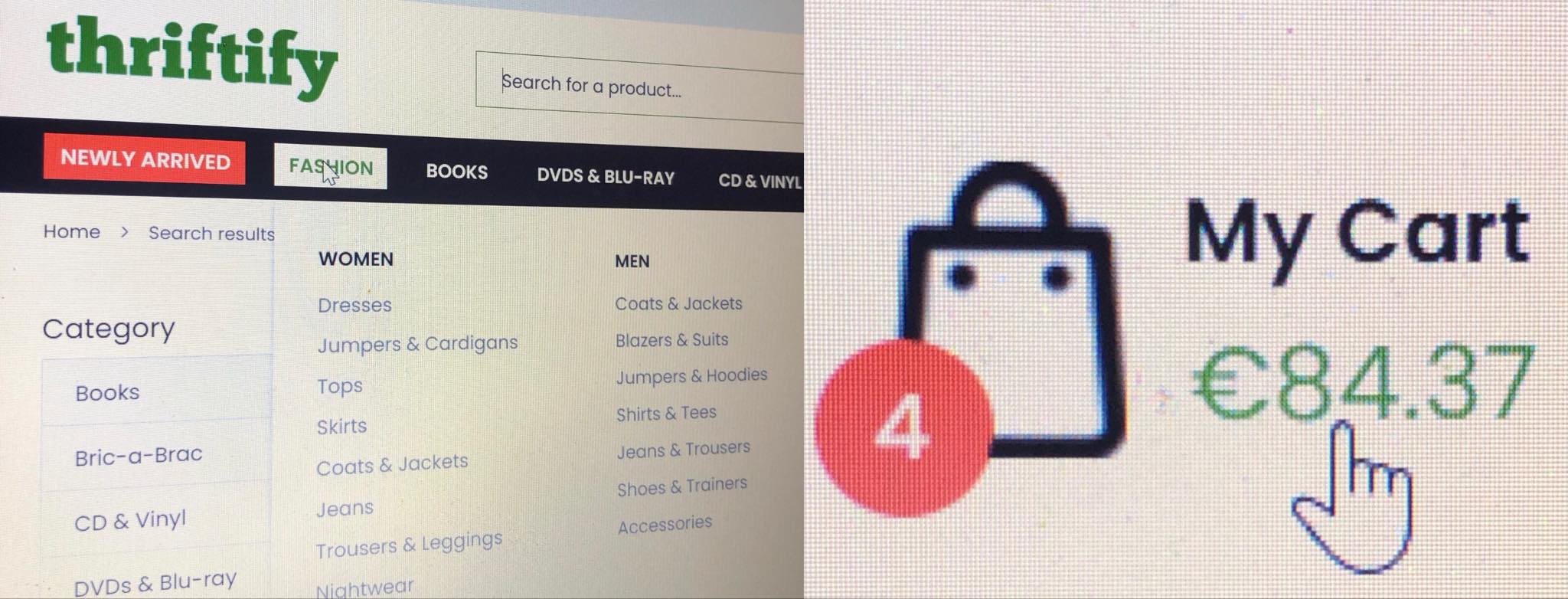By being mindful of your current wardrobe contents you decrease the opportunity of buying slightly varied replicas of what you already own. Trends and styling fads change constantly and companies such as Pretty Little Thing and Boohoo are aware of this and use it to their commercial advantage. The truth is, we are all guilty of buying something we don’t necessarily need, especially when one of the Kardashians looked so good in it. We didn’t have a choice. As a result, your 14th black bodysuit is left gathering dust in the darkest alcoves of your wardrobe and is never worn. Reducing how often we shop online is a major step to shopping more sustainably.
The next step is asking yourself: do I need this? Do I already own something similar? Will I really morph into a Kardashian when I put this on? Don’t get me wrong, I’m familiar with the excitement associated with a new purchase and how great it feels to wear your new fit on the next big night out. However, shopping with a purpose is way more rewarding than shopping for novelty’s sake. Decreasing the volume of clothes in our online shopping baskets has a bigger effect than you realise, not only on the welfare of your AIB current account. We can be both fashionable and ethically and sustainably conscious, they don’t have to be mutually exclusive.
“One person’s trash is another person’s treasure. “
Shopping for vintage and sustainable clothing has expensive connotations, many of our beloved stores stocking pre-loved items in Dublin city centre reinforce this stereotype. As people board the sustainability train, which I personally hope is not temporary, businesses see an opportunity to maximise profits. €40 for a stained jumper? Really? I’m not going to turn this into a targeted call out, but I will offer you some inexpensive alternatives to help you achieve your sustainable fashion dreams. Instagram accounts such as Studio Minti (@studio_minti on Instagram), use their online platform to showcase their shop and studio. Additionally, they take donations of your pre-loved items and sell them at a reasonable price on their online store: Minti.ie. Afterall, one person’s trash is another person’s treasure.
The pandemic restrictions have been tough on all of us and even tougher on our bank accounts. When lockdown began in early March we resorted to seeking comfort in the anticipated arrival of our latest online purchases. Naturally, we turned to the foolproof method of retail therapy to counteract our lockdown blues. Thanks to restricted movements, however, it is more tempting and more accessible than ever to feed into the sites that reign over the fast fashion industry — but that is not your only option. The prevalence of eco-conscious attitudes on social media have propelled the notion of fashion sustainability into our everyday lives. Tips and tricks for shopping ethically, and more importantly, cost efficiently, are everywhere. You just need to know where to look.
“Local charity shops are following this same trajectory and moving at least a portion of their stores online.”
Local charity shops are following this same trajectory and moving at least a portion of their stores online. We may not be able to physically venture out into the world, but being met with online visuals of beautiful, pre-loved items isn’t that bad an alternative. Jack and Jill Children’s Foundation, Saint Vincent DePaul, Simon Community, and others have online stores on Thriftify.ie. You can browse through thousands of items to find exactly the outfit you’re trying to emulate from the comfort of your own home. Think Oh Polly and Shein, but without the mass exploitation. By using Thriftify or similar platforms, you know the clothes you’re buying online are being donated in or around your locality. It cuts down on transportation costs and simultaneously benefits a local charity.
I couldn’t possibly mention pre-loved online platforms without mentioning the infamous Depop. This platform, although incredible in theory, has been exploited by certain sellers hoping to make an easy profit off their own sustainable finds. However, the positives of Depop, in my opinion, outweigh the negatives. You have an opportunity to both buy and sell pre-loved clothing. The platform offers the chance for smaller businesses or independent sellers to kickstart their online stores. As Depop is quite popular, it is possible to refine your searches while shopping sustainably. It’s rare you would ever get the chance to do this in a charity shop where clothing is dependent on local donations.
Make Local your Focal (Point)
Finding my local charity shop online has revolutionised my online shopping as well as
injecting some well needed excitement into lockdown in general. The internet still has more to offer though. I’ve gotten in touch with local artists on Twitter, Instagram and Etsy who sell jewellery, handbags, masks, upcycled clothing, or simply post inspirational ideas you yourself can emulate.
ig: @nmc.govern - jewelry and upcycling
ig: @bourkily.design - eco conscious textile artist
ig: @charityshopglam - sustainable fashion
ig: @prelovingitt - sustainable fashion
ig: @maiseyymade - bags
saoirseryan.com - artist
The novelty of entering your long card number over and over again wears off. Trust me.
Instead of buying something new or pre-loved, why not give upcycling a try? The worldwide web is your oyster when you decide to upcycle. From colourful Pinterest boards to imaginatively edited YouTube tutorials, there are infinite upcycling and DIY channels across a range of platforms. They offer easy to follow steps to help inject a new lease of life into clothes that have lost their vibrancy. You can’t get more sustainable than that. If you’re not naturally gifted with a sewing needle and thread, do not despair — there are upcycling services online that you can avail of to work their transformative powers. Studio Minti, who I have mentioned previously, offer a personal upcycling service through their Instagram and website. The possibilities are endless when you add upcycling to the mix.






